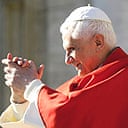An unholy row has broken out at the Pope's television station, with accusations flying that it paid derisory salaries, imposed demeaning conditions, victimised women employees - and even tried to hold a staff meeting to find out if some were virgins.
The director of Telepace (Peace TV), Monsignor Guido Todeschini, is to appear before the council of the Italian journalists' professional body in the next few days to answer claims by employees and the journalists' union. Union representatives will be seeking to find out if he has fulfilled earlier undertakings, given in February, not to monitor employees' telephone calls and to end the practice of requiring journalists to stamp a card at the start and end of work.
The newspaper La Stampa reported yesterday that managers had once called a meeting to discuss the sex lives of its women journalists and establish whether they were virgins. A former employee, speaking on condition of anonymity, told the Guardian the initiative dated back "six or seven years" and was abandoned following an outcry by staff.
The source said women journalists working full-time were kept on part-time contracts with take-home pay of less than £11,000 a year. No one at Telepace was available for comment.
Controversy has been simmering since October 7 when it was announced that the station was closing its Rome-based news operation and getting rid of the four journalists who cover the Vatican.
Telepace broadcasts 24 hours a day throughout Italy and by satellite to Europe, Australia and North America. From next week it plans to transmit only liturgical celebrations, concerts of sacred music and interviews conducted by its director.
The change of strategy has prompted the departure from the station of the canon of St Peter's, Monsignor Dario Rezza, who said in a resignation letter that colleagues had suffered from "a lack of understanding and various vexations".
The new plan also led to a protest by ambassadors accredited to the Holy See, who complained that the closure would cut off a valuable source of information about the Vatican. Giovanni Galassi, the envoy of San Marino and dean of the diplomatic corps, said he had told the Vatican Secretariat of State: "It does not please us to see [Telepace's news services] disappear."
The Holy See has its own television operation, CTV. But its role is to relay images to other broadcasters; it does not have a network of its own.
In a letter to the journalists' union Mr Todeschini said that the "painful decision" to cancel Telepace's bulletins had been forced on him by a drop in revenue. But the Rome Press Association accused him of victimising the journalists for having protested about pay and conditions.
